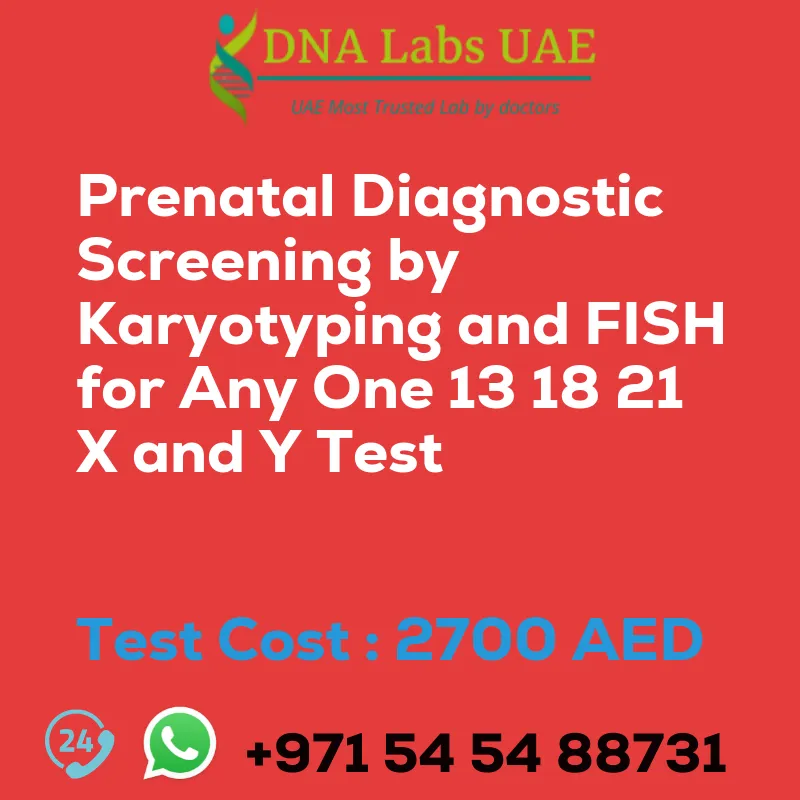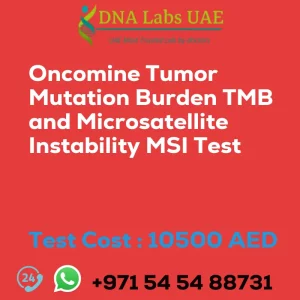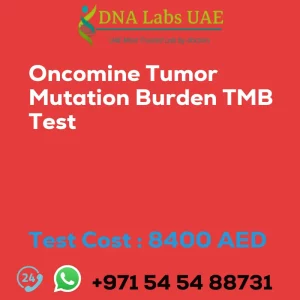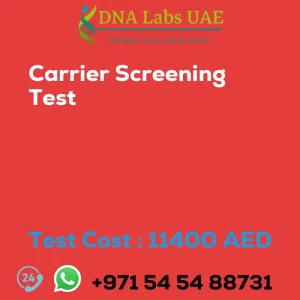Prenatal Diagnostic Screening by Karyotyping and FISH
Test Name: Prenatal Diagnostic Screening by Karyotyping and FISH for any one 13 18 21 X and Y Test
Components: 2 sterile tubes (15 ml. each) / Sterile tissue culture container with normal saline or culture media
Price: 2700.0 AED
Sample Condition: Amniotic fluid / Bits of Chorionic tissue
Report Delivery: 15-20 days
Method: Cell culture + FISH
Test type: Genetics
Doctor: Gynecologist
Test Department:
Pre Test Information
Prenatal Diagnostic Screening by Karyotyping + FISH (for any one 13, 18, 21, X and Y) can be done with a Doctor’s prescription. Prescription is not applicable for surgery and pregnancy cases or people planning to travel abroad.
Test Details
Prenatal diagnostic screening by karyotyping and FISH (Fluorescence In Situ Hybridization) is a method used to detect chromosomal abnormalities in the developing fetus. This screening is typically performed for chromosomes 13, 18, 21, X, and Y.
Karyotyping is a technique that allows the visualization and analysis of the chromosomes in a cell. It involves obtaining a sample of the fetus’s cells, usually through amniocentesis or chorionic villus sampling (CVS), and culturing these cells in a laboratory. The cells are then stained and examined under a microscope to identify any structural or numerical abnormalities in the chromosomes.
FISH is a molecular cytogenetic technique that uses fluorescent probes to bind to specific DNA sequences on the chromosomes. It can be used to detect specific chromosomal abnormalities, such as aneuploidies (abnormal number of chromosomes) or deletions/duplications of specific regions of chromosomes.
In the context of prenatal diagnostic screening, FISH is often used in combination with karyotyping to provide a more comprehensive analysis of the fetal chromosomes. FISH probes specific to chromosomes 13, 18, 21, X, and Y are applied to the fetal cells, and the fluorescent signals are visualized under a microscope. The presence or absence of specific signals indicates whether there are any abnormalities in the number or structure of these chromosomes.
By combining karyotyping and FISH, healthcare providers can obtain a detailed assessment of the fetal chromosomes, specifically looking for abnormalities in chromosomes 13, 18, 21, X, and Y. This screening is commonly offered to pregnant women who are at an increased risk of having a baby with chromosomal abnormalities, such as advanced maternal age or a previous child with a chromosomal disorder.
It is important to note that while prenatal diagnostic screening can provide valuable information about the fetus’s chromosomes, it cannot detect all genetic disorders or birth defects. Additionally, these screening tests carry a small risk of miscarriage, so the decision to undergo prenatal screening should be made after careful consideration and discussion with a healthcare provider.
| Test Name | Prenatal Diagnostic Screening by Karyotyping and FISH for any one 13 18 21 X and Y Test |
|---|---|
| Components | 2 sterile tubes (15 ml. each) / Sterile tissue culture container with normal saline or culture media |
| Price | 2700.0 AED |
| Sample Condition | Amniotic fluid \/ Bits of Chorionic tissue |
| Report Delivery | 15-20 days |
| Method | Cell culture+ FISH |
| Test type | Genetics |
| Doctor | Gynecologist |
| Test Department: | |
| Pre Test Information | Prenatal Diagnostic Screening by Karyotyping + FISH (for any one 13, 18, 21, X and Y) can be done with a Doctors prescription. Prescription is not applicable for surgery and pregnancy cases or people planing to travel abroad. |
| Test Details |
Prenatal diagnostic screening by karyotyping and FISH (Fluorescence In Situ Hybridization) is a method used to detect chromosomal abnormalities in the developing fetus. This screening is typically performed for chromosomes 13, 18, 21, X, and Y. Karyotyping is a technique that allows the visualization and analysis of the chromosomes in a cell. It involves obtaining a sample of the fetus’s cells, usually through amniocentesis or chorionic villus sampling (CVS), and culturing these cells in a laboratory. The cells are then stained and examined under a microscope to identify any structural or numerical abnormalities in the chromosomes. FISH is a molecular cytogenetic technique that uses fluorescent probes to bind to specific DNA sequences on the chromosomes. It can be used to detect specific chromosomal abnormalities, such as aneuploidies (abnormal number of chromosomes) or deletions/duplications of specific regions of chromosomes. In the context of prenatal diagnostic screening, FISH is often used in combination with karyotyping to provide a more comprehensive analysis of the fetal chromosomes. FISH probes specific to chromosomes 13, 18, 21, X, and Y are applied to the fetal cells, and the fluorescent signals are visualized under a microscope. The presence or absence of specific signals indicates whether there are any abnormalities in the number or structure of these chromosomes. By combining karyotyping and FISH, healthcare providers can obtain a detailed assessment of the fetal chromosomes, specifically looking for abnormalities in chromosomes 13, 18, 21, X, and Y. This screening is commonly offered to pregnant women who are at an increased risk of having a baby with chromosomal abnormalities, such as advanced maternal age or a previous child with a chromosomal disorder. It is important to note that while prenatal diagnostic screening can provide valuable information about the fetus’s chromosomes, it cannot detect all genetic disorders or birth defects. Additionally, these screening tests carry a small risk of miscarriage, so the decision to undergo prenatal screening should be made after careful consideration and discussion with a healthcare provider. |







